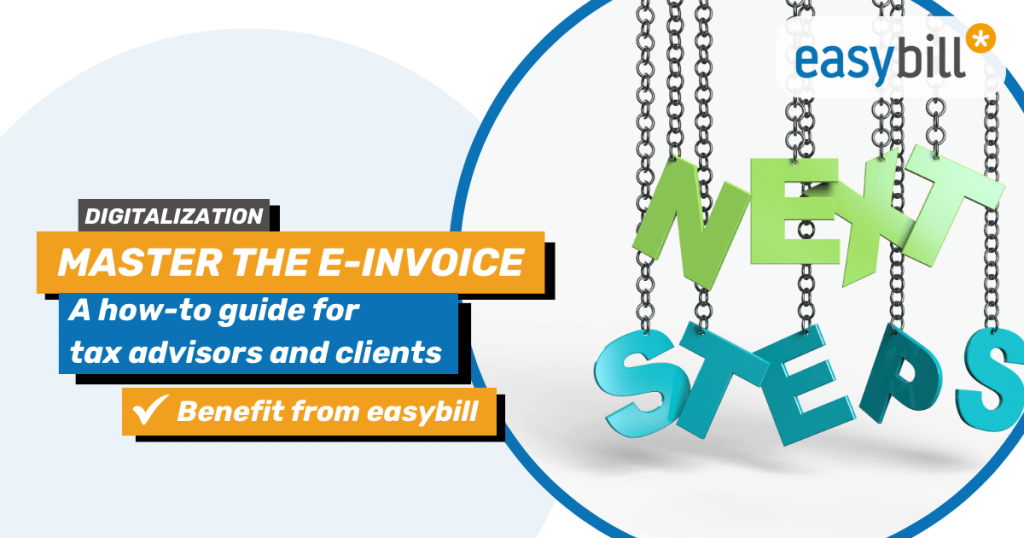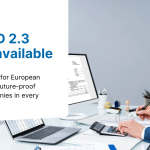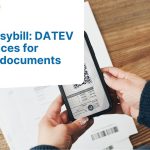
Why is e-invoicing relevant for tax consultants? The Growth Opportunities Act was passed by the Federal Council on 22 March 2024 and many entrepreneurs and tax consultants are now facing changes. E-invoicing is coming and is once again revolutionising the financial and tax market in Germany.
But what exactly is e-invoicing all about? What requirements need to be met? Who is affected at all? And, above all, what do tax consultants and law firms need to bear in mind to ensure that their clients continue to receive the best possible advice and representation?
We have summarised the most important facts and how-to-dos for you so that you, as a tax consultant, are perfectly prepared for the introduction of electronic invoice.
The facts about the introduction of the e-invoice
To ensure that you don’t miss any deadlines, here is an overview of the most important key data on e-invoicing that you and your clients should be aware of:
- From 1 January 2025, the receipt of an e-invoice in accordance with EN16931 will be mandatory for all German B2B transactions – exceptions are small-value invoices up to EUR 250 in accordance with Section 33 UStDV, tickets in accordance with Section 34 UStDV and invoices to end consumers (B2C)
- Until 31 December 2026, there is a transitional regulation that still allows paper invoices and digital invoices that do not correspond to the format of an electronic invoice
- The transitional regulation also stipulates that the recipient of the document must consent if the format of the invoice deviates from the prescribed EN16931-compliant e-invoices
- Until 31 December 2027, this transitional regulation will continue to apply to companies with an annual turnover of less than 800,000 euros
Which format will be permitted for e-invoices in the future?
Many people still confuse a digital PDF invoice with an e-invoice. However, an e-invoice is based on a structured electronic format. It must therefore be able to be read and processed electronically.
For this purpose, either the European standard for the e-invoice in accordance with EN 16931 must be used (currently this is the basis of the XRechnung or ZUGFeRD) or the invoices must use a format that supports the export of structured data in such a way that it can be converted into EN 16931-compatible data formats.
E-invoicing in just 5 steps – tax consultants take note!
Would you like to start preparing your clients for e-billing at an early stage? But do you currently lack an overview of where and, above all, when you should start? We provide you with the 5 most important steps:
Step 1: Get an overview, define compliance and legal framework
In order to be able to advise your clients competently on e-invoicing, you as a tax consultant must of course be 100% familiar with and aware of the requirements, conditions and definitions that e-invoicing entails. Familiarise yourself with the topic, check special situations of your clients, for example in e-commerce, and take advantage of training courses if necessary. Only then can you pass on your knowledge.
It is essential that your clients comply with the legal requirements and standards of e-invoicing. Therefore, make sure that your clients are fully informed about the relevant legal provisions and that internal company processes are aligned accordingly.
Step 2: Analysing the current situation
Analyse the current accounting and invoicing processes in your client’s company together with them. Draw up a joint plan or checklist to record in detail that you are well prepared for the changeover to e-invoicing.
E-billing is sometimes introduced to simplify processes, especially for your law firm.
Step 3: Training and sensitisation
It is important to inform clients about the benefits and requirements of e-invoicing. The tax advisor can organise training courses and workshops to raise awareness and promote understanding of the changeover.
You could offer this training across the board for all your affected clients or, of course, discuss it one-to-one with the business owner in a customised session.
Step 4: Technological evaluation and implementation
As a tax advisor, you should evaluate and recommend the right technology solutions to enable your clients to create, send and receive e-invoices. This can include the integration of e-invoicing software or the customisation of existing systems.
As the first step is the receipt of the e-invoice, you should look for software that guarantees and implements exactly this.
Step 5: Monitoring and support
Even after the implementation of e-invoicing, it is important to continue to support clients and ensure that their systems are running smoothly. The tax advisor should therefore carry out regular reviews and offer support where necessary to ensure that e-invoicing processes remain efficient and compliant.
Use it as an additional service of your law firm. Be the strong partner at your clients’ side. easybill in turn supports you and your clients with flawless technical implementation. So nothing can go wrong with e-invoicing.
Our reading tip!
Prepare your law firm and your clients perfectly for the changeover. Read more about all the facts about e-invoicing.
Read also:
E-invoices made easy: A guide for SMEs
Invoices in ZUGFeRD format (XRechnung) german help center
Sustainable shopping in the digital age: Avocadostore and the future of green retail



